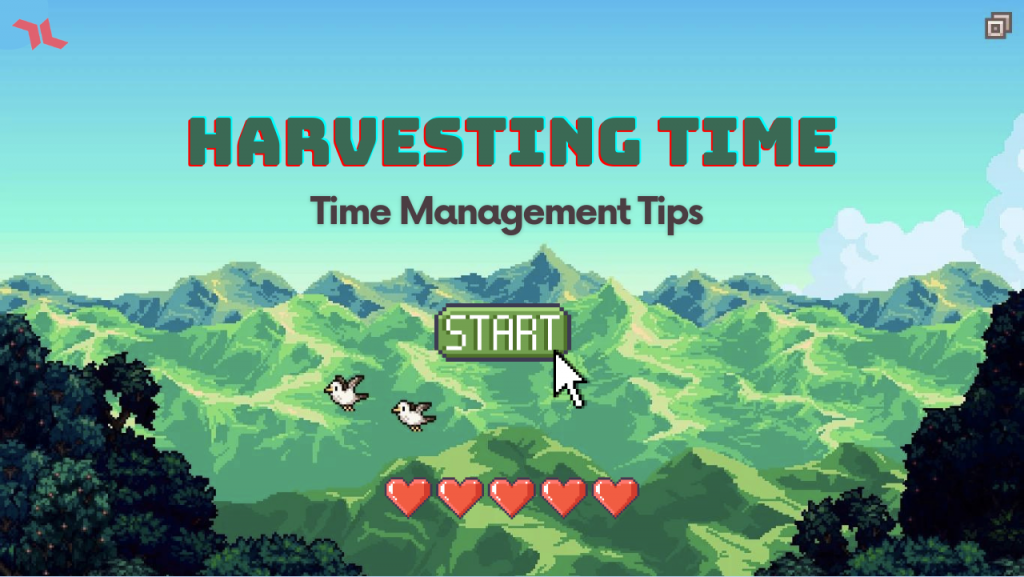Harvesting Time: Time management tips
I've got a question for you: Have you ever played the farming simulation gem, Stardew Valley, or perhaps some similar games? If so, you probably understand the importance of time management within these virtual realms. In this article, we’re about to explore this question, understanding how individuals navigate the complexities of time management, but outside the gaming sphere.

Understanding time management
Time as a concept
Time is a unique and limited resource that controls our lives, so learning how to manage and use it strategically shouldn’t come as a surprise. There’s more to it than just the hours, minutes, and seconds passing on the clock. Think of it as In Stardew Valley, each day is a precious gift that you must manipulate to organize, prioritize, and carry out tasks effectively. Your productivity and general well-being will be impacted by the decisions you make about how to use and distribute the time you have.
Recognizing the challenges:
Just like dealing with crows munching on your crops, we all face unique challenges in managing our time. Recognizing these personal obstacles, or let’s call them frictions, is a crucial first step toward victory.
Procrastination, inadequate job prioritizing, unclear goals, and inadequate responsibility delegation are typical problems. But once these frictions are recognized, employees can confront them head-on. In the end, we can cultivate a more efficient and productive approach to our daily lives, allowing the whole team to maximize their strengths and minimize their weaknesses.
The consequences of ineffective time management
Picture this: the consequences go far beyond missing deadlines and incomplete assignments. It may eventually affect the caliber of work, causing stress and burnout. Project delays, decreased productivity, and a general sense of overwhelm. On a more intimate level, it could limit one’s capacity to advance professionally and fulfill long-term objectives.
Understanding the negative effects of poor time management can be a strong incentive for individuals and businesses to make the investment necessary to create efficient time management plans. When they do, they can improve output, reduce stress, and open the door to long-term success.
Important guidelines for time management
You must become an expert in a few crucial time management concepts if you and your company are to maximize productivity and fulfill the demands of the modern workplace. Let me share with you some cheat codes to better manage your time and increase productivity.
Set SMART goals:
Specific: Define clear goals to prevent confusion
Measurable: Set measurable criteria for tracking progress
Achievable: Set objectives that are achievable and realistic
Relevant: Make sure your goals are in line with your values
Time-bound: Specify a time frame for goal completion to create urgency

Prioritization techniques

The Eisenhower matrix:
Urgent and important quadrant: Immediately address tasks that are both urgent and important
Important, not urgent quadrant: Schedule these tasks for later to prevent last-minute urgency
Urgent, not important quadrant: Delegate these tasks to others if possible
Not urgent and not important quadrant: Minimize or eliminate these tasks to save time
- The ABC method:
A tasks: These are high-priority tasks that are critical to long-term goals
B tasks: Moderately important tasks that support larger objectives
C tasks: Routine or less critical tasks that can be addressed last
Time blocking and scheduling
- Time blocking:
By allocating specific time slots to different activities and tasks, you can maintain focus on a particular task, reducing the likelihood of multitasking. It’s a proven strategy for enhancing overall efficiency by ensuring that each task receives the attention it deserves.
Scheduling
Using digital planners to schedule tasks and appointments is a must for effective time management. It’s important to set reminders and notifications to stay on track and remember to regularly adjust schedules.
Pomodoro technique
Break your work into intervals, typically 25 minutes each, known as pomodoros. Once the timer rings after 25 minutes, it’s time for a well-deserved five-minute break. But here’s where the magic happens: after completing four pomodoros, take a longer break of 15 to 30 minutes.
By working in short, concentrated bursts like this, you’ll find that your focus and productivity are increasing.

Practical time management techniques
Let’s explore some practical techniques to help you efficiently manage time:
Craft your epic schedule!
Just like a skilled farmer tends to their crops with careful planning, creating a well-organized schedule is a practical time management technique. By mapping out your daily, weekly, and monthly plans, you’ll gain a clear understanding of your responsibilities and deadlines, helping you allocate time efficiently among different tasks and activities.
And remember, flexibility is key! Don’t hesitate to review and modify your schedule as needed to improve overall organization.
Break tasks into smaller quests
Ever faced a challenging quest that seemed too overwhelming to complete? Don’t worry! Your objective looks far more attainable when you break that task down into smaller, more manageable pieces. By focusing on smaller tasks, you’ll feel a sense of accomplishment and conquer your goals with ease. Focus on one task at a time, and watch as your productivity blossoms like a well-tended crop.
Trust me, you’ll be amazed at how easily you can finish the work correctly and methodically if you concentrate on its constituent parts.
Delegate and Team up
Everybody has limitations in terms of their abilities and capabilities. Accepting this is essential to time management success, and well, teamwork makes the dream work! Efficiency can be greatly increased by learning to delegate tasks to others. By delegating work to team members or other experts with the required experience, you can capitalize on the expertise of others and reduce your workload.
Making intelligent delegation choices ensures that tasks are completed by the most capable hands and facilitates a more efficient workflow.
Banish Distractions and Time-Wasters
In our quest for productivity and efficiency, there stands a big threat: distractions. Even the most well-planned schedule can be derailed by distractions. Recognize distractions whenever you can, then remove them just like a farmer gets rid of dead weeds.
This could include organizing your workspace and freeing it from clutter and visual distraction, using time blocks for focused work, using “Do Not Disturb” modes, or scheduling specific times to check emails and messages, etc…
With each distraction banished, you unlock the true potential of your mind, sustaining focus, increasing output, and finishing tasks on schedule.
Time Management Tools
A time management plan cannot be complete without the right tools. Using these can greatly improve efficiency and organization. Here are some of the great tools for better time management:
Calendar and task management apps:
Google Calendar: This allows users to schedule events, set reminders, and share calendars with others
Microsoft Outlook: It combines email, calendar, and task management features for comprehensive organization
Trello: This platform utilizes boards, lists, and cards to help organize tasks and projects collaboratively
Time tracking tools:
Tempo Timesheets: This is a powerful tool to easily track the time spent on various tasks, projects, and activities, enabling teams to gain insights into their productivity levels
BillWize: Intuitive tool that provides intuitive features for time tracking, invoice management, and billing. It helps users stay organized, focused, and accountable with their time.
Note-taking and organization app:
- Confluence: A tool that combines note-taking, task management, and collaboration in an all-in-one workspace.
Delegation and group management app:
- Group Ambassadors: A delegation tool that streamlines group management, allowing users to save valuable time and focus on other critical tasks.
Issue Link Management app:
- Bulk Linker: This tool allows you to link multiple issues and perform bulk operations to gain time.
Time Management Challenges
Having a toolkit of techniques and apps to manage your time is necessary, but getting beyond certain common time management challenges is much more crucial. Once you have identified the real cause, addressing these issues will require a combination of strategic planning and self-awareness.
Depending on the time management challenge, we’ve put in place different strategies to help you deal with:
Procrastination: How to get over it
One of the most common time management problems is procrastination, which is the act of delaying something even when you are well aware of the implications. To overcome it, you must recognize the root cause, which can be unclear objectives, a fear of failing, or a lack of motivation.
Here are some effective strategies to overcome procrastination:
Make tasks less intimidating: break them into smaller steps
Set clear deadlines and stick to them
Use the Pomodoro Technique
Always start with less complicated tasks
Visualize your success
Unexpected assignments: How to deal with them
Interruptions… Seriously, who wants to deal with them? Even the most well-planned schedules can be derailed by unexpected tasks, and it causes serious impacts on our time management process. But let’s face it, how often—often, frequently, occasionally—does an unannounced task show up?
Anyway, what’s important is how to deal with this, and we’ve got you covered with these tried-and-true tactics.:
Prioritize tasks that are most important and urgent
Schedule buffer time dedicated to unexpected tasks
Let your coworkers know when you are (or aren’t) available
Delegate when possible
Regularly review your schedule and adjust it as needed
Control your stress
Ineffective time management can lead to stress and burnout. You should prioritize self-care by taking regular breaks, working out, and getting enough sleep to handle tension. Don’t forget to set reasonable expectations, to say no when it’s necessary, and when you need help, just ask.
Here are some strategies to manage stress:
Take regular breaks
Build a supportive network of colleagues
Practice Kaizen at work
Tips-and-tricks for successful long-term time management
Yes, you heard that right! You can achieve long-term time management success. But that would depend on a meticulous and consistent approach. It will also require you to be flexible, devoted to developing good habits, and self-improvement-oriented.
Here are my favorite tips for long-term success in managing time:
Frequent reflection and self-evaluation:
Set a specific time for self-evaluation: Regularly evaluate your time management techniques.
Regularly review your objectives: Take time to review your schedule and priorities regularly. Assess what’s working well and what needs improvement.
Adapt and refine your practices: Continuously improve your time management techniques using gathered insights.
Continuous Training and Development:
Stay up-to-date: Keep yourself informed about new tools, technologies, and techniques for better time management and self-improvement.
Ask for feedback: Always ask your colleagues or mentors for feedback to understand their perspectives.
Accept change: Be flexible to change your tactics based on the evolving needs and situations of your organization or personal life
Develop routines and positive behaviors:
Prioritize small tasks: If a task can be completed quickly, do it immediately rather than adding it to your to-do list.
Stay consistent: Develop routines for organizing, setting priorities, and carrying out your tasks consistently.
Limit multitasking: Focus on one task at a time to maximize efficiency and effectiveness.
Celebrate: Honor and celebrate your achievements to anchor positive time management habits
Assistance and support:
Prioritize small tasks: If a task can be completed quickly, do it immediately rather than adding it to your to-do list.
Stay consistent: Develop routines for organizing, setting priorities, and carrying out your tasks consistently.
Limit multitasking: Focus on one task at a time to maximize efficiency and effectiveness.
Celebrate: Honor and celebrate your achievements to anchor positive time management habits
Conclusion
We can better deal with the challenges of our personal and professional lives if we understand time management.
It may not be a simple process, but adopting these ideas and tactics will give you the ability to accomplish your objectives, increase productivity, and live a more balanced life.
Learning time management is an essential investment in your personal and professional success. It’s a winner-take!


